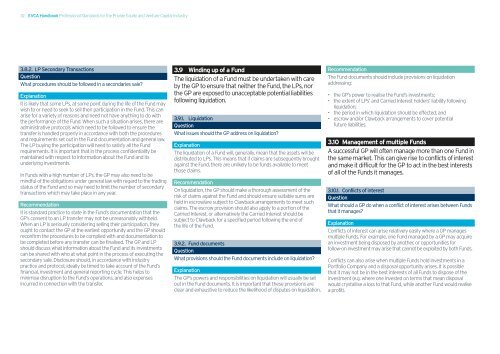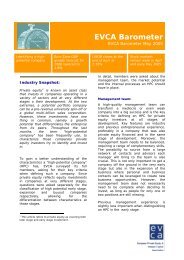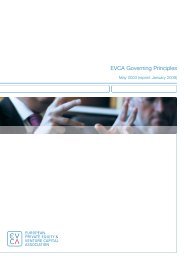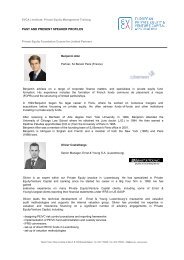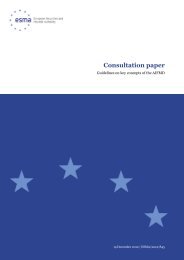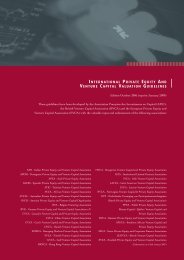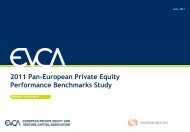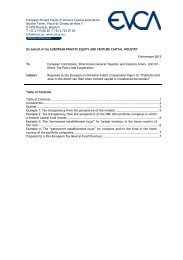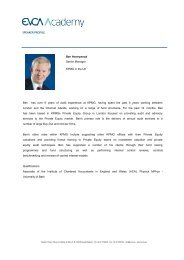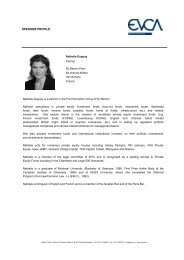EVCA Handbook Professional Standards for the Private Equity and ...
EVCA Handbook Professional Standards for the Private Equity and ...
EVCA Handbook Professional Standards for the Private Equity and ...
- No tags were found...
Create successful ePaper yourself
Turn your PDF publications into a flip-book with our unique Google optimized e-Paper software.
32 <strong>EVCA</strong> <strong>H<strong>and</strong>book</strong> <strong>Professional</strong> <strong>St<strong>and</strong>ards</strong> <strong>for</strong> <strong>the</strong> <strong>Private</strong> <strong>Equity</strong> <strong>and</strong> Venture Capital Industry3.8.2. LP Secondary TransactionsQuestionWhat procedures should be followed in a secondaries sale?ExplanationIt is likely that some LPs, at some point during <strong>the</strong> life of <strong>the</strong> Fund maywish to or need to seek to sell <strong>the</strong>ir participation in <strong>the</strong> Fund. This canarise <strong>for</strong> a variety of reasons <strong>and</strong> need not have anything to do with<strong>the</strong> per<strong>for</strong>mance of <strong>the</strong> Fund. When such a situation arises, <strong>the</strong>re areadministrative protocols which need to be followed to ensure <strong>the</strong>transfer is h<strong>and</strong>led properly in accordance with both <strong>the</strong> procedures<strong>and</strong> requirements set out in <strong>the</strong> Fund documentation <strong>and</strong> general law.The LP buying <strong>the</strong> participation will need to satisfy all <strong>the</strong> Fundrequirements. It is important that in <strong>the</strong> process confidentiality bemaintained with respect to in<strong>for</strong>mation about <strong>the</strong> Fund <strong>and</strong> itsunderlying investments.In Funds with a high number of LPs, <strong>the</strong> GP may also need to bemindful of <strong>the</strong> obligations under general law with regard to <strong>the</strong> tradingstatus of <strong>the</strong> Fund <strong>and</strong> so may need to limit <strong>the</strong> number of secondarytransactions which may take place in any year.RecommendationIt is st<strong>and</strong>ard practice to state in <strong>the</strong> Fund’s documentation that <strong>the</strong>GP’s consent to an LP transfer may not be unreasonably withheld.When an LP is seriously considering selling <strong>the</strong>ir participation, <strong>the</strong>yought to contact <strong>the</strong> GP at <strong>the</strong> earliest opportunity <strong>and</strong> <strong>the</strong> GP shouldreconfirm <strong>the</strong> procedures to be complied with <strong>and</strong> documentation tobe completed be<strong>for</strong>e any transfer can be finalised. The GP <strong>and</strong> LPshould discuss what in<strong>for</strong>mation about <strong>the</strong> Fund <strong>and</strong> its investmentscan be shared with who at what point in <strong>the</strong> process of executing <strong>the</strong>secondary sale. Disclosure should, in accordance with industrypractice <strong>and</strong> protocol, ideally be timed to take account of <strong>the</strong> Fund’sfinancial, investment <strong>and</strong> general reporting cycle. This helps tominimise disruption to <strong>the</strong> Fund’s operations, <strong>and</strong> also expensesincurred in connection with <strong>the</strong> transfer.3.9 Winding up of a FundThe liquidation of a Fund must be undertaken with careby <strong>the</strong> GP to ensure that nei<strong>the</strong>r <strong>the</strong> Fund, <strong>the</strong> LPs, nor<strong>the</strong> GP are exposed to unacceptable potential liabilitiesfollowing liquidation.3.9.1. LiquidationQuestionWhat issues should <strong>the</strong> GP address on liquidation?ExplanationThe liquidation of a Fund will, generally, mean that <strong>the</strong> assets will bedistributed to LPs. This means that if claims are subsequently broughtagainst <strong>the</strong> Fund, <strong>the</strong>re are unlikely to be funds available to meetthose claims.RecommendationOn liquidation, <strong>the</strong> GP should make a thorough assessment of <strong>the</strong>risk of claims against <strong>the</strong> Fund <strong>and</strong> should ensure suitable sums areheld in escrow/are subject to Clawback arrangements to meet suchclaims. The escrow provision should also apply to a portion of <strong>the</strong>Carried Interest, or alternatively <strong>the</strong> Carried Interest should besubject to Clawback <strong>for</strong> a specified period following <strong>the</strong> end of<strong>the</strong> life of <strong>the</strong> Fund.3.9.2. Fund documentsQuestionWhat provisions should <strong>the</strong> Fund documents include on liquidation?ExplanationThe GP’s powers <strong>and</strong> responsibilities on liquidation will usually be setout in <strong>the</strong> Fund documents. It is important that <strong>the</strong>se provisions areclear <strong>and</strong> exhaustive to reduce <strong>the</strong> likelihood of disputes on liquidation.RecommendationThe Fund documents should include provisions on liquidationaddressing:• <strong>the</strong> GP’s power to realise <strong>the</strong> Fund’s investments;• <strong>the</strong> extent of LPs’ <strong>and</strong> Carried Interest holders’ liability followingliquidation;• <strong>the</strong> period in which liquidation should be effected; <strong>and</strong>• escrow <strong>and</strong>/or Clawback arrangements to cover potentialfuture liabilities.3.10 Management of multiple FundsA successful GP will often manage more than one Fund in<strong>the</strong> same market. This can give rise to conflicts of interest<strong>and</strong> make it difficult <strong>for</strong> <strong>the</strong> GP to act in <strong>the</strong> best interestsof all of <strong>the</strong> Funds it manages.3.10.1. Conflicts of interestQuestionWhat should a GP do when a conflict of interest arises between Fundsthat it manages?ExplanationConflicts of interest can arise relatively easily where a GP managesmultiple Funds. For example, one Fund managed by a GP may acquirean investment being disposed by ano<strong>the</strong>r, or opportunities <strong>for</strong>follow-on investment may arise that cannot be exploited by both Funds.Conflicts can also arise when multiple Funds hold investments in aPortfolio Company <strong>and</strong> a disposal opportunity arises. It is possiblethat it may not be in <strong>the</strong> best interests of all Funds to dispose of <strong>the</strong>investment (e.g. where one invested on terms that mean disposalwould crystallise a loss to that Fund, while ano<strong>the</strong>r Fund would realisea profit).


